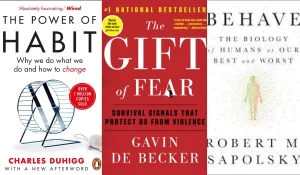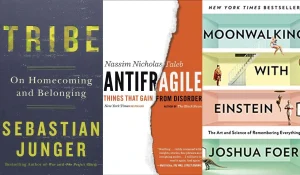Lifestyle
7 Essential Summer Reads To Help Strengthen Your Mind

Want to be rich? Successful? Popular? Fragrant? Chances are, there’s a self-help book promising to get you there, probably with a snappy one-world title in a sans-serif font. The trouble is, vanishingly few of them are actually any good: most just take a TED-talkable idea and run with it for 250 pages, then leave you with the brain equivalent of a carb-crash.
Not these books, however. Some are brand new and others have stood the test of time, but what they all have in common is that they’re jam-packed with actionable advice that might – if you let it percolate – actually change your life. Pick one up today, and retool your brain for the better.
The Power Of Habit – Charles Duhigg
Willpower? Overrated. Most of what you do every day – almost all of it, according to modern behavior science – is a habit, and so changing your habits is the single most important tool you can use to change the rest of your life. What’s more, argues Duhigg, there’s a simple formula to do it: first, find the trigger for your bad habits and the reward you’ve come to expect for performing them, then find a ‘good’ habit that presses the same brain buttons.
Sounds confusing? Don’t worry: this instant classic doesn’t stray too far from the typical self-help template – come up with a simple life tweak, then illustrate it with dozens of bracingly-told anecdotes – but Charlie D’s an excellent writer, and the examples on the show are laser-focused on etching the lessons into your brain. There’s also a comprehensive appendix that goes over the whole thing one more time, so you’ve no excuse to kick your bizarre Pocky-Stick addiction immediately
.
Instant example: Addicted to your 3 pm chocolate fix? First, says Duhigg, figure out the ‘trigger’ for it – boredom, low blood sugar, or a drop in energy. Now, just find a solution that fixes the problem – a chat with a colleague, an apple, or a coffee – that doesn’t come laden with sugar.
Further reading: Duhigg’s Smarter, Faster, Better is a spot-on follow-up, but Daniel Levitin’s The Organised Mind dives into your neuro functions even harder, if that’s not too terrifying a prospect.
The Gift Of Fear – Gavin DeBecker
Behave – Robert Sapolsky
Sure, Gladwell spins a mean yarn, but does he ever get down and dirty at the scientific coalface, stealth-tranquilizing wild baboons in the name of hormonal research? No sir, he does not – but Sapolsky does, and the sort of unquenchable scientific curiosity that leaves you sneaking up on an alpha male monkey is just one of the reasons this book’s such a barnstormer.
Sapolsky’s best known for his work in the field of stress research, but this is his mega-opus: an 800-page examination of why people make the choices they do, combining a century’s-worth of science with just enough wit and whimsy to make it all palatable.
The science gets a bit heavy in places – Sapolsky occasionally insists that you grind through a chunky appendix on the structure of neurons before you can get on with the fun stuff – but you’ll emerge on the other side a wiser, better-behaved person.
Most important line: ‘If you’re stressed like a normal mammal in an acute physical crisis, the stress response is lifesaving. But if instead you chronically activate the stress response for reasons of psychological stress, your health suffers.’ In other words, stop freaking out about things you’ve read on social media.
Further reading: Why Zebras Don’t Get Ulcers is Sapolsky’s meister-work on stress – his specialist subject – but if you’re after a yarn that’s alternately ripping and heartstring-twanging, invest in a Primate’s Tale, his biographical account of almost two decades hanging out with those baboons above in the Serengeti.
On Sparta- Plutarch
You’ve got to have a favorite Roman philosopher, haven’t you? Most people, of course, plump for good old dependable Seneca The Younger, with his ‘practice poverty’ and his ‘brave men rejoice in adversity brand of stoicism. If you’re feeling spicy, sure, you might go for Marcus Aurelius, and toss in the odd ‘Everything we hear is an opinion, not a fact,’ to make yourself unbearable in Twitter conversations – but you know who’s underrated and ready for a revival? Plutarch.
Good old Plutarch, who was so into the Spartan culture he wrote a whole series of books about it, investigating everything from their interesting coinage – Spartan king Lycurgus introduced iron currency that was so heavy nobody wanted much of it – to their thoughts on haircuts ‘Long hair renders handsome men better looking, and ugly ones more frightening.’
There’s also enough here on economics, strategy, and warfare to have modern-day applications, though your passive-aggressive email feud with Peter from accounts is unlikely to end up with anyone losing an eye.
Bonus fact: Contrary to what you’ve seen in 300, the Spartans were actually fine about not murdering soldiers on the retreat. ‘After they had beaten the enemy and made them flee, they gave chase only far enough to confirm the victory by their opponents’ flight’, points out Plutarch, ‘This practice was not only splendid and magnanimous, it also paid dividends: it was known that Spartans would kill those who stood in their way, but would spare those who surrendered.’
Further reading: Parallel Lives is the Plutarch classic, a whistle-stop bash through the biographies of some of the most influential Greeks and Romans of all time. Though, of course, you could always go the Aurelius route and get stuck into Meditations.
Tribe- Sebastian Junger
If we’re all doing so well, why aren’t we happier? That’s one of the key questions at the heart of this expertly-delivered little slice of smartness, which argues – among other things – that a lack of connection and purpose is at the heart of our thoroughly modern malaise.
Junger dances from discussions of Native American coming-of-age rituals to Londoners’ behavior during the Blitz to examine how people come together in adverse conditions, arguing that depression and PTSD are part-consequences of a loss of tribal connection that it’s vital we get back – and that if we don’t, all the external motivations in the world won’t help much.
Best line: ‘The beauty and the tragedy of the modern world is that it eliminates many situations that require people to demonstrate a commitment to the collective good…an urban man might go through his entire life without ever having to come to the aid of someone in danger, or even give up his dinner.’
Further reading: Junger’s previous books, War and The Perfect Storm, are the perfect accompaniment to Tribe – both examinations of how small groups and larger communities survive, even if they don’t thrive, under severe stress.
Moonwalking With Einstein – Joshua Foer
Most people, when they’re going the full Theroux on an interesting sub-culture, are happy to just dip a toe into the water – a quick couple of interviews, maybe some fieldwork if things get interesting, then onto the next thing. Nooooot Joshua Foer. When he got into the world of elite memorizing, Josh got into it: throwing himself fully into a sport involving memorizing entire packs of cards, dozens of faces, and hundreds of numbers.
He ended up – spoilers! – as the US champion, and this examination of how is, arguably, the closest a book will ever come to giving you superpowers: read it, and by the time you’ve finished you’ll almost certainly be able to memorize whole strings of facts, names, and faces that have otherwise eluded you.
Short version: it’s all to do with the fact that we’ve evolved with an impressive spatial memory – probably thanks to our hunter-gatherer past – meaning that if you plop the things you’re trying to recall down in a ‘memory palace,’ you’ll be able to stroll past (and retrieve) them at will.
Best fact: You might already be aware of ‘chicken sexers’ – the assembly-line workers who sort male and female birds at birth, lowering the price of eggs worldwide – but did you know that the best in the world graduate from the two-year Zen-Nippon Chick Sexing School, where only 5 to 10 percent of students receive accreditation… and earn 500 dollars a day? It’s still not a fun job though.
Further reading: It’s not entirely the same ballpark, but once you’ve got the facts in order, bang through Adam Grant’s Originals to unlock the more creative chunks of your grey matter.
Antifragile – Nicolas Taleb
Pop quiz, hotshot: what’s the opposite of ‘fragile’? If you said ‘tough’, risk analyst and statistician Nicolas Taleb says you’re wrong – he defines things that are ‘antifragile’ as ones that aren’t just resistant to disorder, but *benefit* from it. Your body, for instance, is fragile – shocks to the system make it get more robust – and so are most of Taleb’s investments, which made him millions when the 2008 collapse proved him right about the volatility of the financial system.
‘It’s far easier to figure out if something is fragile than to predict the occurrence of an event that may harm it,’ says Taleb, and in the fast-shifting environment of a mid-Trump world – where every job from cab driver to copywriter’s feeling the sting of automation replacing the workforce – he’s probably right. The only uncertainty is certain – so, according to Taleb, the solution is to become ‘antifragile’, by designing a lifestyle where you aren’t just resilient in the face of upheaval, but actually benefit from it.
Or, if you’re a government, designing economic policies and flood barriers by bearing in mind that the worst conditions in history might not actually be the worst thing that can happen. Read this for fascinating discourses on statistics, probability, weightlifting, and Greek myths…and, y’know, to prepare yourself for whatever the next terrible thing that’s going to happen in 2018.
Best line: ‘You can’t predict in general, but you can predict that people who rely on predictions are taking more risk. An overconfident pilot will eventually crash the plane.’
Further reading: Skin In The Game, the sort of sequel to Antifragile, goes into more detail on why you shouldn’t trust people who aren’t financially (or physically) invested in the advice they give you – and why reading one book twice is sometimes better than reading two books once.

